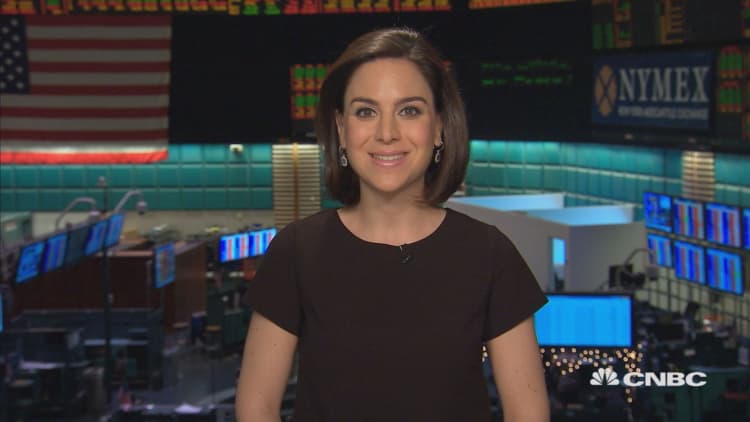


This is breaking news. Please check back for updates.
Last month, deliveries of petroleum rose by 3.6 percent from a year ago to 19.7 million barrels per day, marking the highest April deliveries in eight years, the American Petroleum Institute reported on Thursday.
"April continued this year's trend of record gasoline demand thanks to low prices," said Erica Bowman, API chief economist, said in a statement. Record high crude oil stocks – the highest since 1920 – contributed to the record high gasoline consumer demand for the month of April."
On Thursday, oil prices fell as U.S. rate hike expectations lifted the dollar, but crude pared losses on worries about more supply outages from Nigeria's main crude oil terminal.
Growing expectations that the U.S. Federal Reserve may raise rates next month prompted investors to cash out of long positions in Brent and U.S. crude's West Texas Intermediate (WTI) futures. Those positions came into the money after oil rallied on Monday and Tuesday on worries about supply outages.
By Thursday afternoon, Brent and WTI were sharply off session lows after the Qua Iboe crude oil terminal, Nigeria's largest which typically exports more than 300,000 barrels per day, was reported closed due to militants' threats.
Workers of at the terminal, operated by ExxonMobil, have been evacuated and its tanks have been emptied, said the report, quoting traders.
An ExxonMobil spokesman later clarified that production was still "ongoing" at the terminal, although business was disrupted earlier on Thursday by "criminal" activity early.
"The report on the Nigerian terminal closure was being passed around, and had possibly helped crude prices come off their lows," said Scott Shelton, broker with ICAP in Durham, North Carolina.
Production cuts at French refineries owned by Total amid worker strikes were also providing some support to prices, Again Capital founding partner John Kilduff told CNBC.
Brent crude's front-month contract for July was down 8 cents at $48.85 a barrel. It had fallen as much as $1.55, or more than 3 percent, during the session low to $47.38.
U.S. crude's June contract, which expired as front-month at Thursday's settlement, settled at $48.16, down 3 cents, or 0.1 percent. It had fallen to $46.73 earlier.
Oil tumbled in early trade, extending losses from the previous session that followed release of the Fed's April policy meeting minutes that fed expectations of a June rate hike. On Thursday, New York Fed President William Dudley said the central bank was on track for a June or July rate increase.
The dollar index, measured against a basket of currencies, hit a near two-month high, furthering its gains from the previous session that made the greenback-denonimated oil less attractive to holders of other currencies.
Some analysts said the soaring dollar would probably slow the recovery in crude prices, but not stop it. Brent is up from $27 in January and WTI has rebounded from $26 levels in February.
"We feel that the adjusted Fed stance is capable of extracting about $2 a barrel from potential WTI and Brent highs," said Jim Ritterbusch of Chicago-based oil consultancy Ritterbusch & Associates.
Oil prices gained 3 percent over the first two days of the week on fresh threats to Canadian supplies from wildfires and worries about Nigerian, Libyan and Venezuelan supply outages.
Analysts at BNP Paribas said oil markets have moved "too high, too far, too soon."
"We still face a large inventory overhang and for the most part, the outstanding supply outages — Canada and Nigeria — are reversible," they said in a report.
Despite the outages and falling U.S. output amid lower investment by shale drillers, OPEC production is at its highest in years thanks in part to higher Iranian exports.
OPEC and non-members including Russia failed at an April 17 meeting to agree on an initiative to freeze output. OPEC meets on June 2 to set output policy and is not expected to decide on any measures to limit supplies.
— CNBC's Tom DiChristopher contributed to this report.




